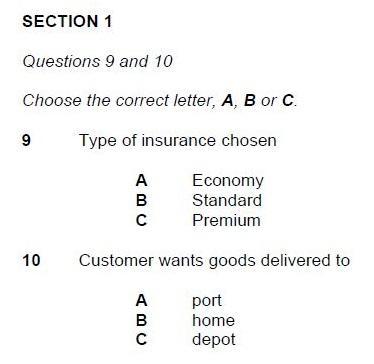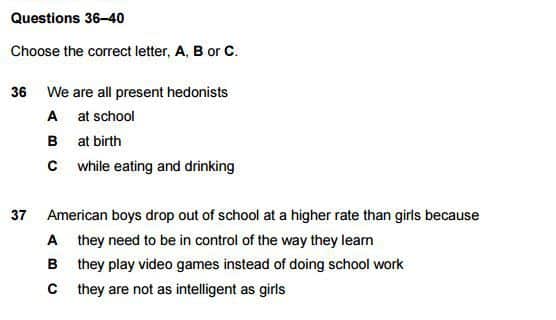This post will show you how to effectively answer multiple choice questions in the IELTS listening test. It will show you the three different types of multiple choice questions, look at common problems and give you tips and a strategy to help you on test day.
3 Kinds of Multiple Choice Questions
There are three different formats for these questions.
The first is a short answer multiple choice question. You will be given a statement and a number of different options to choose from. Below is a picture of a sample question.

Source: Cambridge English IELTS Past Papers.
The second type of multiple choice questions are sentence completion questions. You will be given a sentence stem and you will have to complete it with one of a number of options. Below is an example.
Source: Cambridge English IELTS Past Papers.
The last kind is when you are given a sentence and you have to match this to one of a number of pictures.
Some multiple choice questions require you to choose more than one answer from a variety of options. You may be asked to choose two answers from five options or four answers from seven options. Approach these in the same way you would a single answer question.
Common Problems
- When given three choices, like above, you are likely to hear the speaker talking about all three options. Just because you hear it mentioned, doesn’t make it correct. You must select the correct answer, not the first one you hear.
- The answers will normally come in the form of synonyms or paraphrases. Don’t just listen for exact matches; think about how the answer could be expressed using synonyms or paraphrasing.
- The three choices often look similar in meaning and it may be difficult for you to tell the difference. Look for keywords in the different options that allow you to tell the difference between the different options.
- This is not just a test of your listening skills but also your reading skills. There is much more to read in multiple choice questions, so practice underlining the keywords in the questions and quickly understanding the difference between the different options.
Tips
- Don’t check your answers from the previous section when you have a break. It is important that you read the multiple choice questions and try to understand them.
- Highlight keywords. The keyword in the question will help you answer the question correctly. The keywords in the different options are those that differentiate meaning between the choices.
- Don’t write the first answer you hear. Remember that they will try and trick you.
- Don’t spend too much time on one question. If you didn’t get the answer or you are unsure, make an educated guess and move on.
- Be careful if you hear words like ‘but’ or ‘however’. This often means that the speaker is going to qualify a previous statement.
- Practice makes perfect.
- Your answer will often be a letter and not a word. Read the instructions to make sure and be careful when transferring your answers at the end.
Strategy
- Read the instructions carefully.
- Read the questions and identify what is actually being asked. Highlight the keyword in the question.
- Look at the different options and underline any keywords that help you tell the difference in meaning.
- Think of any synonyms or paraphrases you might hear.
- Predict the answer.
- When listening, listen for any keywords and synonyms.
- Don’t write the first answer you hear. They will probably talk about more than one option so wait until they have talked about them all and then answer. Be careful with answers that are given by the speaker and then taken away.
- If you think an answer is correct, put a tick beside it and keep listening to make sure.
- Don’t spend any more time than is necessary. If you miss an answer, make a guess and move on.
Next Steps
For further listening practice, visit the British Council IELTS site.
I would also recommend you look at our articles on general listening tips and how to practice listening.
I hope you found this guide useful and if you have any comments or questions, please let me know below.
The best way to keep up to date with more great posts like these is to like our Facebook page and receive daily updates.

